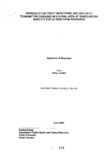| dc.contributor.author | Hashima-E-Nasreen | |
| dc.date.accessioned | 2019-11-20T06:03:46Z | |
| dc.date.available | 2019-11-20T06:03:46Z | |
| dc.date.issued | 2001-06 | |
| dc.identifier.citation | Nasreen, H. E. (2001, June). Reproductive tract infections and sexually transmitted diseases in a rural area of Bangladesh: insights for action from research. Research Reports (2001): Health Studies, Vol - XXX, 169–215. | en_US |
| dc.identifier.uri | http://hdl.handle.net/10361/13030 | |
| dc.description.abstract | Objectives: The study aimed· to assess the magnitude of problem associated with
RTis/STDs in rural Matlab, Bangladesh. It estimates the prevalence and attempts to
explore the risk indicators for RTis and STDs among people of different age group within
the existing socio-cultural context.
Methods: A combination of qualitative and quantitative research methods was utilized. Indepth
interview, focus group discussion, and a cross-sectional survey of randomly
selected men, women, and adolescent boys and girls were the main methods employed.
The ICDDR, B surveillance database provided the sampling frame.
Results: About 19% of people in Matlab have had STDs. Lack of awareness, risky sexual
behaviour, lack of accessibility and availability of adequate services, traditional and
unhygienic health practices, absence of programme efforts, and illiteracy and poverty
were the prevalent soia-cultural factors that potentially has put people at risk of RTis,
STDs as well as HIV/AIDS epidemic. The bridge between non-commercial and
commercial partners was laid by men whom work in urban area push up the likelihood of
infection from the high risk (urban) to low risk group of women in the village. Risky sexual
behaviour was also prevalent among adolescents. Partners' communication and treatment
seeking behaviour were found to be very poor among adults and not at all among
adolescents. There is a need for collaborative action addressing rural people's riskassessment
component.
Conclusion: To avert the situation, a holistic approach should be adopted with greater
emphasis on RTI/STD control and prevention together with human relationship,
communication , gender, family interaction and socio-economic status that would
determine the nature and extent of people's risk and vulnerabilities. Because of the
sensitivity of issue, it is important to think about how to achieve community acceptance. so
that programme can expand and sustain itself. | en_US |
| dc.language.iso | en | en_US |
| dc.publisher | BRAC Research and Evaluation Division (RED) | en_US |
| dc.subject | STD | en_US |
| dc.subject | BRAC | en_US |
| dc.subject | Rural Bangladesh | en_US |
| dc.subject | HIV/AIDS | en_US |
| dc.subject | RTIs/STDs | en_US |
| dc.subject.lcsh | Sexually transmitted diseases | |
| dc.subject.lcsh | Public health -- Bangladesh | |
| dc.subject.lcsh | Rural health--Bangladesh. | |
| dc.title | Reproductive tract infections and sexually transmitted diseases in a rural area of Bangladesh: insights for action from research | en_US |
| dc.type | Research report | en_US |

